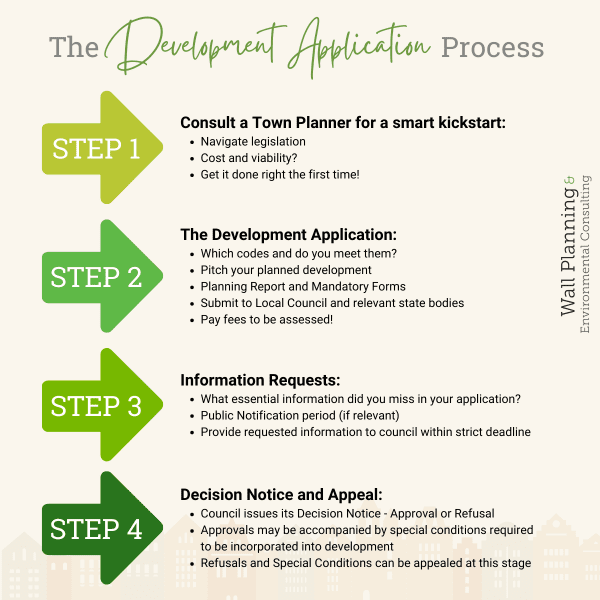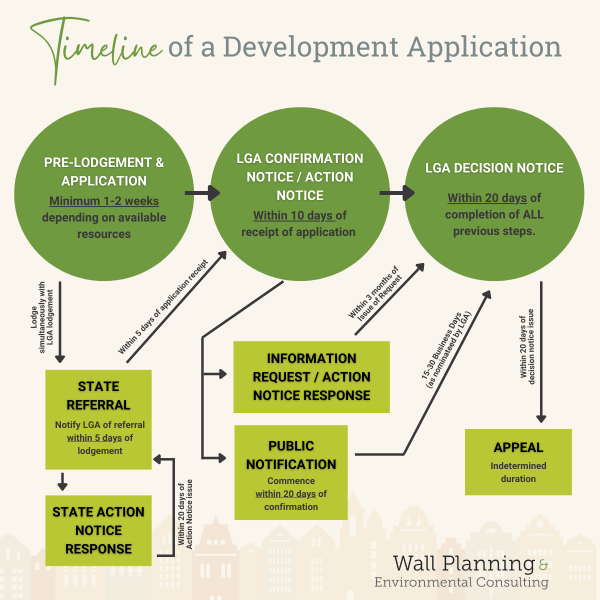Why Does Planning Approval Take So Long? And What Can You Do About It?
One of the most commonly asked questions of town planners is, “How long does planning approval take?”. This isn’t exactly a short answer question and, unfortunately, it’s usually longer than you’d like it to be. So, let’s take a closer look at why planning approval can take so long – and what can you do about it?
Preparing the Application
Applying for development approval is more than just a quick form. It requires careful study and addressing of local and state government planning legislation. A standard application in Queensland will, generally, require the following:
- Development Application Form;
- Development Application Report addressing local and state legislation;
- Title Search and Owner’s Consent;
- Current and Proposed Plans;
- Referral to State governing bodies such as the State Assessment and Referral Agency (SARA), if triggered;
- Any other supporting documentation, as required.
Preparing this documentation in itself can take time and will depend upon the workload of your town planner, who will let you know their capabilities at that time.
The Development Application Process
The approval process itself isn’t cut and dried, though it is a set process and is governed by the state’s planning guidelines. In Queensland, those guidelines are the Development Assessment Rules, set by Queensland Government Planning and based around the Planning Act 2016.
This (sometimes hefty) process followed by all local councils in Queensland are:
- Pre-Lodgement – this is not a formal part of the assessment process but may be required or recommended for developments that may not strictly adhere to all the set assessment criteria. A pre-lodgement meeting can be a good way to gauge the chances of approval being granted and what would be required for potential approval. This meeting does not guarantee approval but can guide the application.
- Application – this is when your town planner grabs all the legislation relevant to your property, puts it all in one report, and addresses potentially hundreds of assessment criteria specific to your project – they plead your case. This is then submitted with all related documentation to local government and, if triggered, to the State Assessment and Referral Agency (SARA) or other State governing body. All fees must be paid for the application to proceed.
- Referral – If state legislation is applicable for the property, the application must be referred to SARA, or other required State governing body, for assessment before it can go through final assessment with local council. If state assessment is not required, the application is submitted directly to the local Council.
- Information Request – After reading the application, the local Council has the opportunity to request for information to address any concerns or queries they might have that have not been addressed already within the application. A formal response, with related documentation, must then be provided to the Council.
- Public Notification – Some, but not all, developments will trigger a public notification period to help the community better understand and allow time to provide feedback on the planned development. This particularly applies to impact assessable developments.
- Decision – This phase can be a straight approval or refusal from the Council, but can also be encumbered by specific conditions that must be met for the development to legally occur.
- Appeal – This final phase is only required if the applicant requires certain conditions or the refusal to be reconsidered. These are lodged with the Planning and Environment Court.

Is There A Time Limit?
The following time limits (unless negotiated otherwise) are set as a part of the Development Assessment Rules:

- Confirmation Notice Period – the application must be read by Council and deemed a properly made application within 10 days of the application being lodged. Note – this is not the assessment period, but a check that all information has been properly supplied.
- Action Notice Period – if the application is deemed ‘not a properly made application’, the Council must issue an Action Notice within the 10-day period, which the applicant must comply with and respond to within 20 days from issue of the action notice.
- Referral – If the application required referral to a State referral agency, the agency must determine within 5 days after receipt of the application whether it was properly referred or not. Any action notices from a referring agency must be complied with within 20 days. This will delay the 5 day requirement of the referral confirmation notice.
- Information Request – if the application triggers an information request, it must be issued within the 10-day assessment period. The applicant must provide a response within 3 months from the issue of the Information Request.
- Public Notification – if public notification is triggered, it must be commenced within 20 days of receiving the confirmation notice from Council, which will stipulate whether the required public notification stage is 15 business days or 30 business days.
- Decision Notice – A decision notice cannot be issued until all above (relevant) steps have been completed. Upon completion of all previous steps, the assessment manager must assess and issue a decision notice within 35 days.
- Appeal – An appeal regarding a Decision Notice must be lodged within 20 days of issue of the Decision Notice. This appeal is made through the Planning and Environment Court and the timeframe will vary depending upon the case and the court.
Taking all these variables into consideration, a simple and straightforward application may only take approximately one month to be approved. However, more complex applications could take anything up to approximately 6 months!
This is without taking into consideration appeals and the time spent putting the application report and documentation together before submission.
What Can You Do About It?
Be prepared and be pro-active!
You can’t truly speed up the process, however by hiring a professional town planner to complete a concise and comprehensive report – and making sure you have ALL documentation ready for submission – you can minimise the chances of information requests and action notices occurring.
When your town planner lets you know what is required for the application to be submission-ready, there is not much that can be done until that information and documentation is supplied. Your town planner relies on your organisational skills and the deadlines of other contracted professionals to be able to complete your application and address information and action notices in a timely manner.
PAG Will Deal With That Weighty Process
We have the professional knowledge, connections, and experience to get your application done in the best possible time-frame to achieve the best possible results.
Contact us today and learn more in your 20-minute consultation.










